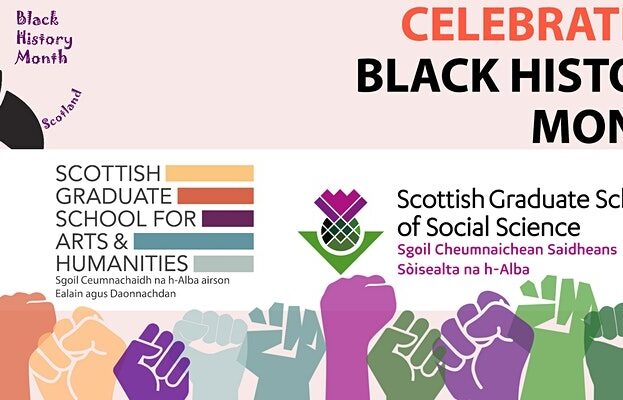
As part of the Scotland’s Black History Month programme in October 2021, the Scottish Graduate Schools of Social Science (SGSSS) and Arts and Humanities (SGSAH) are joining forces with a number of AHRC and ESRC DTPs to offer a series of ‘Lunchtime talks’ celebrating the history, achievements and contributions of black and minority ethnic people from across and beyond Scotland.
The talks will take place every Tuesday and on one Wednesday and two Thursdays in October from 1.10 – 2pm.
Tuesday 5 Oct
Chantelle Taylor – Birthing Blackness: Using influential black mothers to situate my own identity following the birth of my black boys
Chantelle Taylor is a 1st year Social Sciences Doctoral Researcher at Loughborough University. Until recently I never felt black. A candid rethinking of my own identity as a mother of black boys. Looking at what it means to perform the identity of mother. Delving into who I was, and how I identified before I started raising my black men and how mothering in the current climate has changed that. Exploring the black mothers who have paved the way thus far and discussing how feminist research can improve the lives of minority mothers.
Mohammed Abdullahi – Proud to Be: Shining a Light on the Role of Black Doctors in the NHS
Mohammed Abdullahi is a 3rd year Social Sciences Doctoral Researcher at the University of Warwick. Overseas doctors have been part of the successful running of the NHS since its inception in 1948. Whilst the NHS offers opportunities for professional advancement for African doctors, there are issues of racism, an ethnic pay gap and poor career progression compared to their White counterparts. The poaching of these doctors plays havoc with the healthcare systems of the low-income countries. For example, at the height of the pandemic, when international borders were closed, 58 Nigerian Intensive Care doctors were enticed to the UK. They were promised high salaries. This was a time when Nigeria needed its doctors the most.
Thursday 7 Oct
Katherine Burns – “Keep this Unwritten History”: African American Family Histories in “Information Wanted” Advertisements.
Katherine Burns is a 3rd year Arts and Humanities Doctoral Researcher at the University of Edinburgh. This talk examines “Information Wanted” advertisements which formerly enslaved people used to reconnect with lost family members after the American Civil War. These advertisements are an underutilised historical resource and are vitally important for their portrayal of individual and collective social, emotional and political realities, particularly regarding the revisionist and radical ways in which they were used by formerly enslaved people to record their family histories. This talk will examine what these advertisements reveal about the Black family in the post-emancipation era and how formerly enslaved people utilised these advertisements as ground-breaking spaces for writing Black history.
Marianne Golinucci – “Here we ur / wimmin in the 80s”: Maud Sulter’s poetry of the ‘borderlands’ in post-industrial Glasgow.
Marianne Golinucci is a 1st year Doctoral Researcher in the Arts and Humanities at the University of Glasgow. Maud Sulter was a Ghanaian-Scottish artist, poet, playwright and activist born in Glasgow in 1960. While her artistic production is being increasingly rediscovered, her poetry has not received the recognition it deserves. In the socio-historical and literary context in which it emerged, however, it significantly challenged established narratives and introduced a new, markedly Black Scottish feminist perspective. With echoes ranging from Audre Lorde to Edwin Morgan, Sulter’s poetry was keen to illustrate the interlocking power dynamics that race, gender, and class generated in the Gorbals area of Glasgow in post-industrial times. Analysis of selected poems will exemplify her Black Scottish aesthetic.
Tuesday 12 Oct
Khadija Koroma – Igbo Women and Motherhood in Buchi Emecheta’s The Joys of Motherhood
Khadija Koroma is a 1st year Arts and Humanities Doctoral Researcher at the University of Leicester. Join us for a session on Igbo culture, womanhood and motherhood as presented in Buchi Emecheta’s The Joys of Motherhood. The discussion will include an exploration of precolonial ideals of Igbo womanhood and motherhood and the effects of colonialism on those ideals. It will also look at different Nigerian women’s movements of the 1970s and 80s and the role that motherhood plays within those movements.
Chinweuju Nzewi – Women of manifestly un-English appearance or speech
Chinweuji Nzewi is a 1st year Doctoral Researcher in Arts and Humanities at the University of Strathclyde. Historically, when writing about the journey, challenges and growth of women in diplomacy, the stories specific to Black women and their participation in diplomacy have been neglected. Bell Hooks had argued that it is easier for women who do not experience race or class to focus exclusively on gender when writing about the challenges of women. In this presentation, I will shed light on how the various facets of Black women’s lives, (race, gender, sexuality and class) combine to shape their representation and navigation of the world of diplomacy.
Wednesday 13 Oct
What does Black History Month mean in Britain Today?
Speakers
Dr Rochelle Rowe, Lecturer in Black British History, University of Edinburgh
Surbhi Sachdeva, Doctoral Candidate, University of the West of Scotland
Zandra Yeaman, Curator of Discomfort, The Hunterian
Chair
Nelson Cummins, Coalition for Race Equality and Rights (CRER)
How and in what ways should we understand Black History Month (BHM) in Britain today? From an all-encompassing ‘Diversity Month’, to a means of highlighting the role and function of anti-Black racism, to an elevation Black histories in Britain and the Global North, what is at stake in BHM is, to quote Gail Lewis, more than an annual ‘moment in racial time’. Join us for this discussion convened by RACE.ED, the Scottish Graduate School for Arts and Humanities (SGSAH) and Scottish Graduate School of Social Science (SGSSS), where we invite practitioners, researchers and PGR colleagues to reflect critically on the myriad of ways BHM is pursued and what this means for our present and future.
RACE.ED is a cross-university network concerned with race, racialization and decolonial studies from a multidisciplinary perspective at The University of Edinburgh. The network reflects a coming a together in 2018 of teachers, researchers and students, and spans disciplines and interdisciplinary fields in Arts, Humanities and Social Science, Medicine, ands Science and Engineering.
SGSAH and SGSSS are national graduate schools focussed on inspiring and supporting post-doctoral researchers in Arts and Humanities (SGSAH) and Social Sciences (SGSSS) across all universities in Scotland. They are also home to the AHRC and ESRC Doctoral Training Partnerships for Scotland, each funding approximately 60 researchers per year.
CRER is a Scottish strategic racial equality charity, based in Glasgow. We are focused on working to eliminate racial discrimination and harassment and promote racial justice across Scotland. Over the years CRER has had a key role in advocating, campaigning, and influencing developments to promote racial equality. We have been effective in responding to a broad range of interests needed to make an impact upon deep rooted issues and respond to the needs of communities.
Speaker Bios
Nelson Cummins is the Communities and Campaigns Officer at the Coalition for Racial Equality and Rights (CRER). Nelson works with partners and community members to coordinate CRER programmes, events and networks including Black History Month
Dr Rochelle Rowe-Wiseman is a Lecturer in Black British History at Edinburgh University. Her first book, Imagining Caribbean Womanhood, tells a feminist history of Black beauty spanning the British West Indies, Harlem and postwar London and is published by Manchester University Press. Her next work, to be published in a multi-volume collection by Bloomsbury, The Cultural History of Beauty, explores black Victorian women and beauty in the age of empire.
Zandra Yeaman leads the Museums Galleries Scotland funded Curating Discomfort project, bringing to bear many years of professional experience working in the social justice and equality field, promoting diversity and inclusion. Currently on secondment from The Coalition for Racial Equality and Rights (CRER), Zandra leads on initiatives such as Black History Month, the Empire Museum Campaign and provides support for the Glasgow Voluntary Sector Race Equality Network. Internationally, Zandra has collaborated with The Smithsonian’s National Museum of African American History and Culture.
Surbhi Sachdeva is the student representative for the People and Place hub at SGSSS. She is pursuing a PhD degree at the University of the West of Scotland; her research is focused on studying the nature of Scottish national identity and the role of elites in the process of identity formation in contemporary Scotland. She has been an active member of the SGSSS and the student community in Scotland. She is very interested in the student issues, issues of women in academia and challenges of the BAME community in particular.


